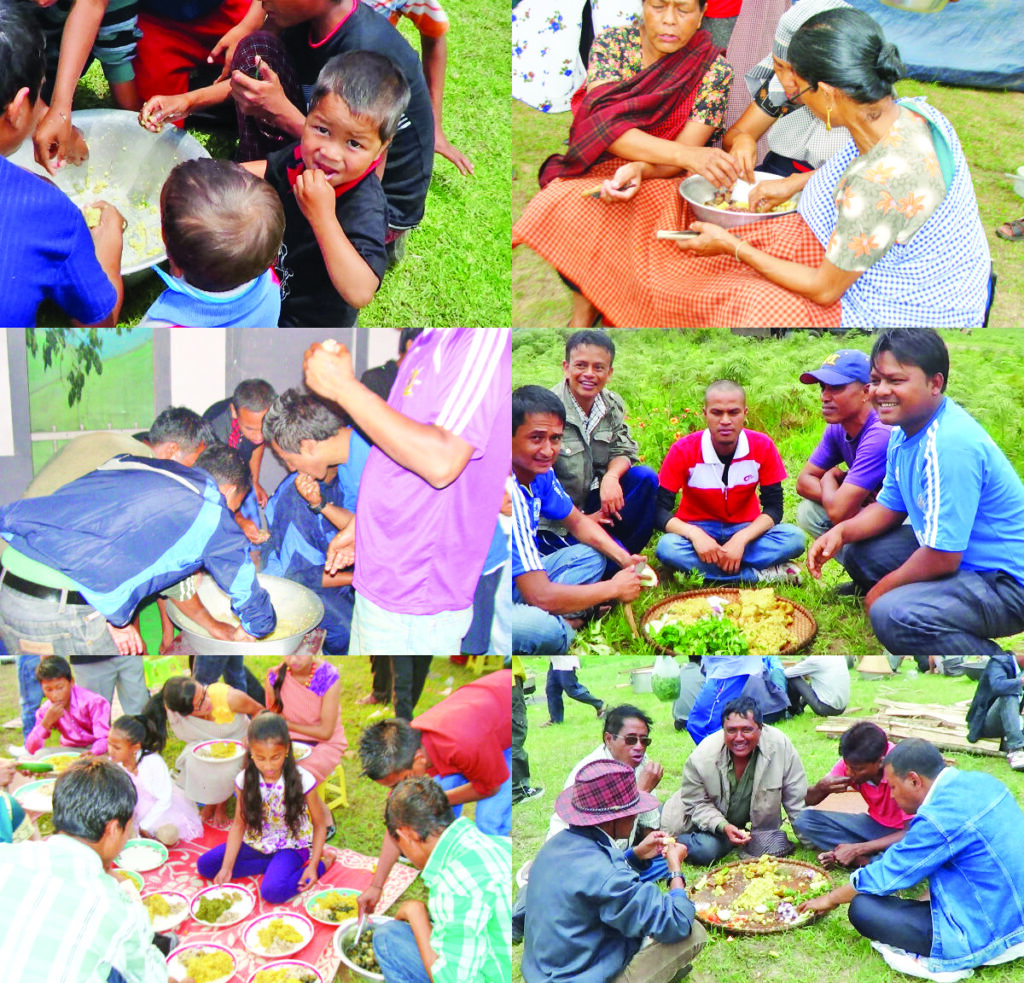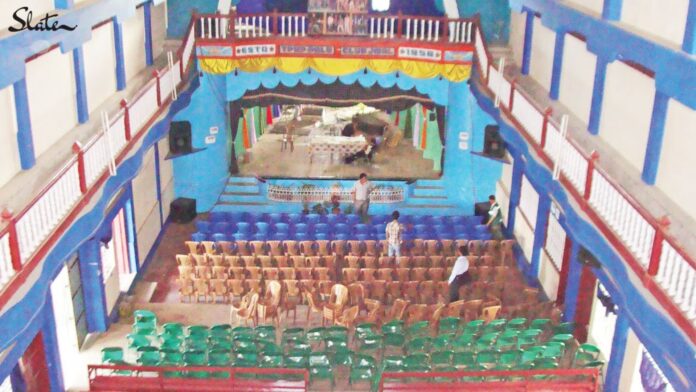Closer to home, the Jaintia community has its own distinct folk theatre, which takes place in seven localities of Jowai, inhabited by the followers of Niamtre, the Jaintia indigenous faith.
The seven localities are Panaliar, Loompyrdi, Loomkyrwiang, Chilliang Raij, Loomiongkjam, Dulong and Tpep Pale.
In the words of Eudora Khonglah, Associate Professor, Department of English, Lady Keane College, “This theatre tradition is alive and happens only in seven localities in Jowai. Most of them are dominated by followers of the Niamtre, and secular in nature.”
“If you look at history, they resisted the British influence. When I interviewed the people of Loompyrdi, I got to know how their theatre tradition is not inherited from the British. Rather, they were influenced by the theatre tradition of Jatra. Jaintiapur was part of India before going to Bangladesh. The tradition started from there. There was economic and cultural exchange between the people. This theatre tradition has existed for a long time.”
The Jaintia folk theatre is unique because it is locality-centric. Only people residing in a particular locality can contribute as playwrights and actors. Even tea stalls are set up by people from the locality, thereby reflecting the close-knit relationship between the people.
But why this exclusivity, one may wonder?
“They like to promote each other given it’s a space to build confidence and showcase their talent as ‘a string of theatrical performances’ take place. It begins with scripting in March, followed by performances in April and goes on for over two months.”
Auditions are held, followed by rehearsals until the day arrives. Usually, it is not a one-day affair, extending for two to three consecutive nights, commencing at 10 pm that go on till 2 am.
A Space to Perform
A performance space, locally referred to as yungwalieh (Translated: The White House), a kind of proscenium theatre, is where people gather to watch plays. The colour white has special significance, representing purity, making this space sacred in the eyes of the people.
There are pictures of the original yungwalieh. “It is so beautiful to witness how the communities try to preserve their roots, keeping their culture alive,” Khonglah said.
People from other communities are welcome to watch but it includes buying a donor ticket. That said, it may not guarantee a seat because there is a certain way to pick the number. “It’s similar to a lucky draw. Though times have changed and ticket prices have risen. People can now afford the money and get the ticket easily,” she said.
The proscenium theatre has a special significance for the community. Its sacred value is always upheld during meetings and dorbars. None can leave the space unless they find solutions to problems.
“It belongs to the people as a space to gather during different occasions,” she added.

Themes and Genres
Thematically, Jaintia plays explore a wide range of subjects. The seven localities have their own genres as well.
Most of the theatrical pieces are satirical in nature. All of their plays are original – none of them are adaptations. “The scripts are so well-written. One needs to read them to know,” Khonglah pointed out.
Loompyrdi and Loomiongkjam, for instance, prefer dramas on Pnar myths and legends, while Tpep Pale have their own version of western cowboy stories where they wear cowboy hats and boots, making them their own. Panaliar, on the other hand, is known for its comedies.
Historical plays are equally popular. U Kiang Nangbah, the legendary freedom fighter, is popular on the stage. One such play is titled, U Kiang Nangbah: U Dap Chynrang, written by Omarlin Kyndiah, who also acted in the play.
“The plays on him focus on how special he is, and how he got the golden flower (Syntu Ksiar),” Khonglah said.
Bamphalar – Secular in Spirit!
Translated, the word bamphalar means, “eating outside”.
Eating boiled eggs is a ritual… a “must-have” item during the performance. It’s symbolic and a common item in all the stalls. Jadoh, momos, and chana are other popular food items sold during the occasion.
After the performance, a big community feast is organised, where all the people of the locality share a meal together.
“I remember speaking to (Late) Ma Quotient Sumer, the Jewel of the Jaintia community, who shared the significance of the term bamphalar,” Khonglah said.
She recalled, “Usually people don’t eat outside, but when they do they become equal under the sky. The sky means God and everyone is equal in the eyes of God. Everyone eats the same food from one pot, and there is no special dish for anyone. People can contribute in the feast. The poor are equally welcome as the rich who can afford to contribute more. The occasion symbolises fraternity. Even the songs performed during the plays are played during the bamphalar. It’s a true Republic!”
“People who have been ostracised by the community or have migrated elsewhere return home. Everyone is accepted, an act of forgiveness. Such is the power of this tradition,” she added.
A curious connection
Speaking on British response to the Jaintia theatre tradition, Khonglah emphasised on how they were not allowed to watch because of the satirical nature of the plays.
During the British time, people had to take permission for the bamphalar.
“You must know how they banned the Behdeinkhlam festival… more reason for the people to resist them,” she said.
There is a connection between bamphalar and Behdeinkhlam – the money collected during the theatre performances is used during the festival and to make the rath (chariot). People buy clothes during the bamphalar that they wear in Behdeinkhlam.
Is Ignorance Bliss?
The fall of the Western Roman empire also meant a shift in power in Constantinople (Eastern Roman Empire). Culturally, this was significant in the context of preservation of classical Greek texts – a source of information on Greek theatre.
For western Europe, this spelled chaos, starting the so-called “Dark Ages”, where theatre performances were viewed to be pagan, therefore, discouraged and even denounced by the Church. Despite this, the tradition did not completely disappear.
The irony in all this : the evolution of liturgical dramas, where Biblical events became the basis to observe certain important celebrations.
Could something similar have happened here?
Khonglah does not necessarily agree. Times have changed in this regard.
“All the seven localities welcome the Christian Pnars to participate in the plays. They accept anyone from the locality as long as they belong to the locality. People are more accommodating now. Religion comes last, which shows the inherent secular spirit,” she said.
The Way Ahead!
Theatre traditions are either dying out or being revived.
Khonglah mentioned how the Rympei Theatrical Centre (RTC) staged wonderful plays. An offshoot of theatre is being revived in Mawphlang, which had faded out earlier.
In Smit area too, there is a theatre tradition, but much remains to be achieved to ensure its proper growth.
In this context, what should be done?
Khonglah said, “People should realise the good things that theatre brings. It could generate employment as well. An illiterate individual who has not completed his/her education may have talent as a dancer, director, makeup artist and as a playwright. The bamphalar tradition is a stepping stone to Jollywood, the Jaintia film industry. So why not nurture the talent here?”


